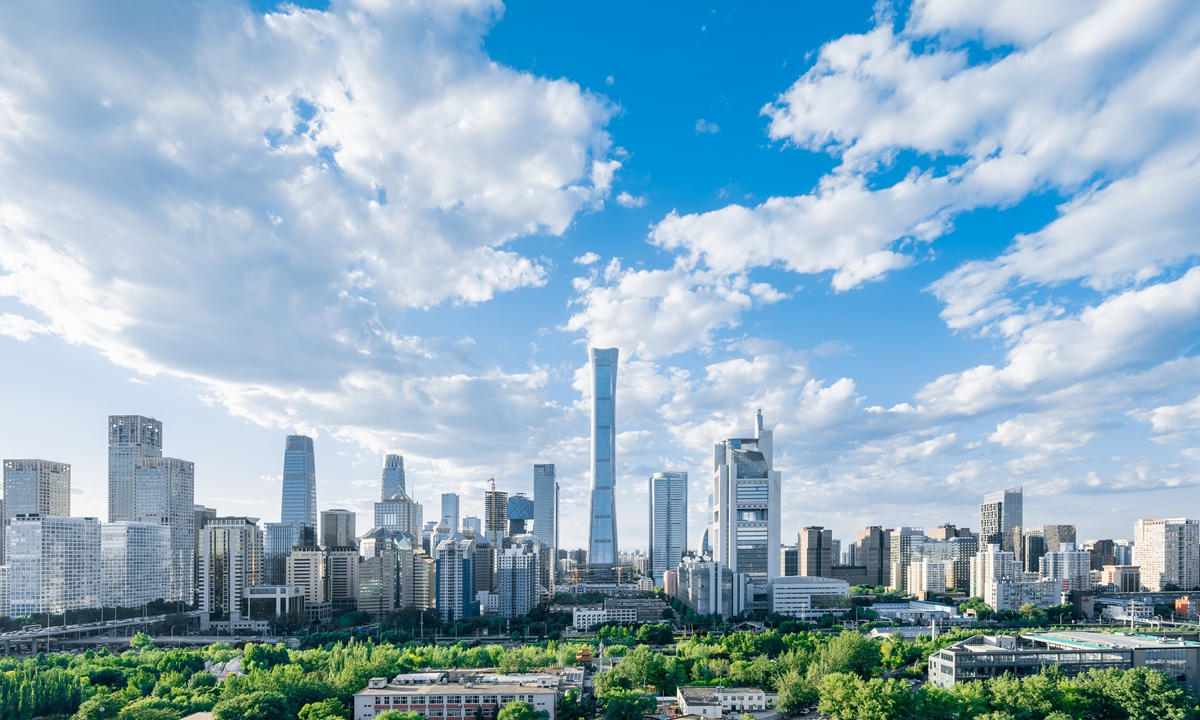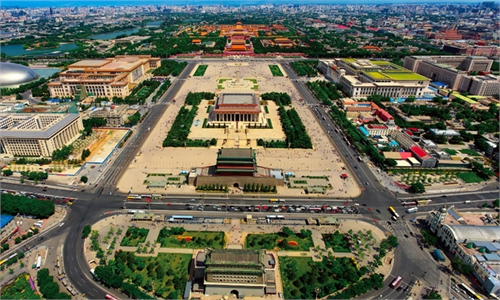IN-DEPTH / IN-DEPTH
Beijing remains the 7th on the International Exchange Centers Index with obvious advantages in scientific innovation, historical and cultural resources

The Beijing skyline Photo: VCG
Beijing remains seventh on the International Exchange Centers Index 2024 with obvious advantages in growing influence in international affairs, increasing strength in scientific innovation and a rich historical and cultural heritage, the Global Times learned at a press conference of the report at Tsinghua University in Beijing on Wednesday.
The ranking remained unchanged from 2023 report, the first of its kind in the world. But the capital has made significant progress in specific dimensions, according to the report.
With the gradual fading of the impact of the COVID-19 epidemic, the number of exchanges between Chinese and foreign personnel is increasing, and Beijing's international communication activity is gradually recovering from a short-term impact, according to the report.
International exchange centers usually have the capabilities to allocate global or regional resources regarding international affairs, economic development, sci-tech innovation, as well as culture and education. Calculations show that Beijing's ranking in the dimension of influence has also risen from third place in the previous round to second place, following London, according to the report.
Beijing has a significant influence on sci-tech innovation, culture, and education, benefiting from high-quality technological innovation resources, higher education resources, and a rich historical and cultural heritage.
Over the past decade till the end of 2023, Beijing has published 14,000 highly cited scientific papers, ranking first among the participating cities. In the past two years till the end of 2023, it has published 410 hot scientific papers, also ranking first. In terms of economic development influence, Beijing has fully utilized its economic policy resources and financial resources, playing an increasingly important role in global economic development and resource allocation, rising from fifth place to third place in the ranking.
Among all participating cities, Beijing has the most headquarters belonging to Fortune 500 companies and ranks sixth in the entrepreneurial environment. Compared to the previous evaluation, Beijing's fastest area of progress is in the level of digital network connectivity, especially with a mobile network average speed of 133.6Mbps recorded at the end of 2023, a growth rate of 125.9 percent, far exceeding the 35.5 percent growth rate of participating cities, jumping from sixth place in the previous round to first place, according to the report.
On July 23, 14 factions from Palestine, including Fatah and Hamas, with key support from China, reached a historic declaration for nationwide reconciliation in Beijing on Tuesday.
On Saturday, "Beijing Central Axis: A Building Ensemble Exhibiting the Ideal Order of the Chinese Capital" was listed as a World Heritage Site at the 46th session of the UNESCO World Heritage Committee held in New Delhi, India, becoming China's 59th entry on the list.

Groups of foreign tourists walk outside Beijing’s Palace Museum on July 9, 2024. In the first half of the year, 14.635 million foreigners entered the country through various ports, an increase of 152.7 percent year-on-year, data from the National Immigration Administration showed. Among them, 8.542 million entered the country under visa-free policies. Photo: cnsphoto
These improvements demonstrated Beijing's influence while also put forward higher requirements for the capital to play a better role in handling international affairs and protecting world heritages, according to Yang Yongheng, vice dean of the China Institute for Development Planning (CIDP) of Tsinghua University said at the Wednesday press conference.
In addition to Beijing, the report also evaluated a number of cities in the Chinese mainland including Shanghai, Shenzhen, and Guangzhou. Shanghai's overall ranking rose six places to 11th place, with an attractiveness ranking of 37th, an influence ranking of 12th, and a connectivity ranking of 4th. Shenzhen ranked 32nd overall, with an attractiveness ranking of 35th, an influence ranking of 24th, and a connectivity ranking of 30th. Guangzhou ranked 37th overall, with an attractiveness ranking of 38th, an influence ranking of 32nd, and a connectivity ranking of 27th.
The report was jointly compiled by the China Institute for Development Planning of Tsinghua University and Deloitte China, following comprehensive research of 37 cities worldwide.
Against the background of the global economy's slow recovery from the COVID-19 pandemic, the Ukraine crisis, and other impacts, the International Exchange Centers Index 2024 aims to study the new characteristics of international exchange activities in the post-pandemic era, comprehensively and accurately grasp the new trends in the evolution of cities serving as international exchange centers, thereby offering reference on promoting international development and enhancing international exchange functions of major cities worldwide, read the report.
The report reveals new characteristics of international exchange centers in the post-pandemic era.
A notable characteristic is that digital connectivity is crucial for offsetting the impacts of the pandemic and enhancing international influence. For instance, the rapid increase in Internet speed in Shanghai and Beijing has significantly improved the cities' digital connectivity with the international community.
As to the new trends of the international exchange centers, the reports notes that digital technology, especially the rapid development of artificial intelligence, is having a profound impact on international exchanges, presenting new challenges to urban development and international governance.
Resilience and safety have become key criteria for global immigration destinations in the post-pandemic era. Internationalized metropolises like Sydney and Singapore are favored by high-end international immigrant groups due to their good social security, convenient international transportation, strong urban disaster resistance, and sufficient energy and resource security.
The population of Singapore increased from 5.4536 million in June 2021 to 5.9176 million in June 2023, with a net increase of 464,000 people, including non-resident population increasing from 1.4667 million to 1.7684 million, a net increase of 301,700 people. In addition, Dubai attracted 71,600 new residents during the same period and Shenzhen 31,800. On the opposite, the prominent issue of gun crime in American cities becomes a significant factor dragging down livability, according to the report.
Looking ahead, the report suggests that international communication center cities should pay more attention to building their own unique charm, balancing localization and internationalization, continuously improving digital survival and communication capabilities, and constructing a more efficient and open urban network framework.



